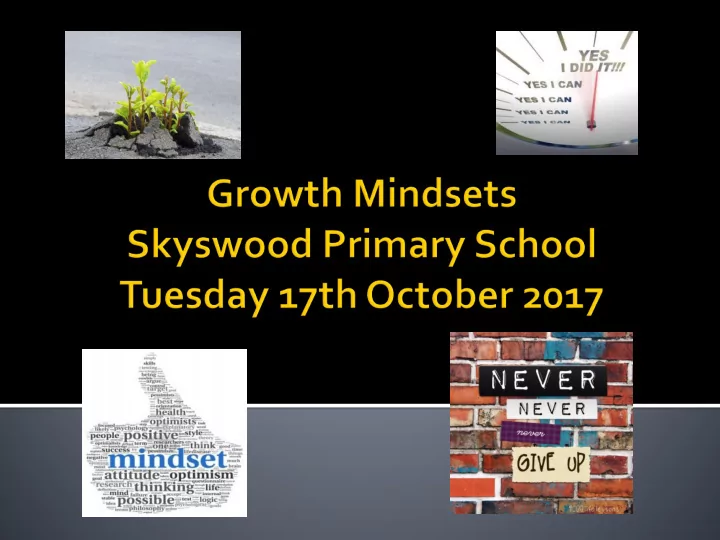

We now understand more about ourselves as learners than ever before. With a ‘fixed mindset’ we believe that there are things that we simply cannot learn to do. With a ‘growth mindset’ we understand that the most powerful learning can come from addressing our ‘mistakes . ’ We enjoy the challenge of coming out of our comfort zones and develop resilience when things don’t automatically go to plan.
Positive self-belief is vital if we are to reach our true potential.. The language that we use is essential. High quality feedback has a significant impact. Appropriate ‘pitch’ of learning will challenge and motivate our children. Emphasis must be given to building resilience and developing skills of self-evaluation. An open ended, investigative approach to learning supports a growth mindset culture. An understanding of how our brain works can help to embed a growth mindset.
Skyswood Primary & Nursery School Improvement Plan 2017/18 To embed a growth mindset culture of learning throughout the school ‘We cannot fully succeed without learning that it’s okay to fail.’
Schools can embed practices that support a growth mindset approach, but to create a growth mindset culture then all stakeholders need to be on board. Parental attitudes are critical.
Children as Teachers Talk Partners We retain 5 to 10% of what we see or hear, Encourages engagement of ALL as opposed to 90% of what we teach! Chilli Challenge Investigative, enquiry-based curriculum Encourages children to take Motivates children and encourages ownership of their own learning deeper thinking.
The brain is like a muscle that can be developed and grow in strength. Our brain does not grow from making mistakes as if by magic , it is how we respond to our mistakes that is critical in order to develop a growth mindset. https://www.youtube.com/watch?v=ELpfYCZa87g
https://www.youtube.com/watch?v=2zrtHt3bBmQ
Those kids with a ‘fixed mindset’ • Research shows more girls have a fixed mindset than boys in maths • ‘Higher ability’ pupils often have a fixed mindset; having always received praise for being ‘smart’, they won’t take on further challenges for fear of losing that ‘smart’ label • ‘Lower ability’ pupils with a fixed mindset perceive themselves as ‘not smart’ and only ever capable of tackling ‘easy’ tasks • These kids see ‘failure’ as something to be avoided, so stay firmly in their comfort zone
You have a real talent for this; you’re a natural! You got them all right, fantastic! Praise Well done! You are very clever to remember all those Wow! Great drawing! facts. What an artist!
The Language that we use really matters! When similar children were given fixed mindset praise (“you did that really well; you are so clever at doing puzzles!”) or growth mindset praise (“you did that really well; you must have tried really hard!”) it dramatically reduced or improved their ability to progress onto harder puzzles.
It was great how you You must have put tried lots of different a lot of time and strategies to get the effort into this work. answers. Good job! Growth Mindset Praise Look at how much You stuck at this better your second really well and didn’t attempt was – give up. Super effort! well done!
The best kind of praise... • is sincere • is well-deserved • is relevant • is linked to process (learning), rather than outcome (achievement) • is consistent • is supported through wider reflection and evaluation
“The surest path to high self -esteem is to be successful at something one perceived would be difficult! Each time we steal a student’s struggle, we steal the opportunity for them to build self-confidence. They must learn to do difficult things to feel good about themselves.” Sylvia Rimm
Recommend
More recommend